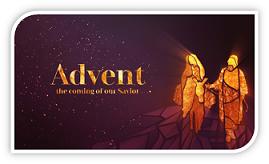Advent: How? Why? What?
Advent: How? Why? What?
November 30, 1986 introduces Advent and, simultaneously, a new Christian ecclesiastical year. For a four-week season prior to Christmas, the message of Advent sets the tone for the Christian church's festival season which reverberates its way through Passion, Good Friday, Easter, Ascension, and ultimately, Pentecost.
"Advent" is a Latin word which means coming, arriving, approaching, and often contains the notion of haste. The church calls its four-week pre-Christmas season Advent because of the comings of Jesus Christ. In the fulness of time, He came with haste in Bethlehem's manger (the First Advent); similarly, He shall come again with haste upon the clouds when God's time is ripe (the Second Advent).
Advent: How did we receive it? Why do we commemorate it? What is the essence of true Advent worship?
The "how" of Advent⤒🔗
During the church's first three centuries, only Jesus' resurrection at Easter was celebrated annually. Gradually the custom of preparing for the Easter season arose – hence the seven-week Passion period. The earliest recording of Christmas celebration is 335 A.D. In the following century, a season of preparation for Christmas called Advent surfaced in France. Thus, Advent was related to Christmas much as Passion was to Easter.
Advent became more widespread in the Middle Ages. In 1574, a Reformed Synod abolished both Christmas and Advent but readmitted Christmas in 1578. Mention of Advent does not recur in our tradition until 1877. Since then the bulk of Reformed churches have participated in Advent commemoration – most commonly by means of special sermons related to Christ's coming on the four Sundays prior to Christmas.
The "why" of Advent←⤒🔗
But why observe Advent and the annual church cycle of feasts? What is its profit?
First, the Advent-to-Pentecost season benefits the church by placing her annually before the whole cycle of God's saving work in Christ. In the Spirit's hands, such an unrolling of Christ's step-by-step meriting of redemption fosters a deep appreciation for the whole counsel and grace of God in the true believer's heart.
Second, each feast is worthy to be commemorated separately for each possesses unique relevance and affords matter for personal examination. In Advent, for example, Jesus' first coming examines whether we have ever needed Him to be born in our hearts; His second coming examines our readiness for eternity.
Third, the church season displays the Lord as a God of order in salvation. How edifying and instructive it is for the church to follows the budding, unfolding, and flowering of salvation from Bethlehem's manger to the Spirit's outpouring! When accompanied by the Spirit's blessing, the church calendar's revelation of a carefully executed plan of salvation lends itself to a profound admiration of the Triune God Himself.
Fourth, the church season also underscores an experiential order of grace in the heart of the true believer. God first plants need for Christ (Advent) before revealing Him to the heart (Christmas). As the child of God matures spiritually, he learns to find his life in Jesus' sufferings (Passion) and death (Good Friday). In the furtherance of grace, the true Christian experiences that he must "die daily;' but may by grace find his death in a living, exalted Christ who is risen from the dead (Easter) and intercedes for him at the right hand of the Father (Ascension). He recognizes the value of finding life in a dying Jesus at Calvary, but learns the supremacy of finding death in a living Jesus at the Father's right hand. Hence his only comfort in life and death is in not belonging to self, but in belonging to the faithful Savior, Jesus Christ (Heid. Cat., Q. 1), who, in turn, introduces him to the fatherly care of God. If blessed experientially with the personal knowledge of God Triune, he learns to increasingly find his source of strength in Jesus as his Advocate in heaven and in the Spirit of Christ as Advocate and Sealer in his heart (Pentecost). Blessed are they who can confess experientially: Christmas – God for us; Easter – God with us; Pentecost – God in us!
The "what" of Advent←⤒🔗
Advent in particular serves a threefold purpose:
 First, Advent memorializes the past. Scripture is a historical volume of progressive redemption. When the Old Testament Israelite was called to "remember" Jehovah's past acts, something more than a mere act of recall was intended. The New Testament church, under instruction of her Lord, is called to commemorate Holy Supper "in remembrance of" Christ. To truly remember is to memorialize God's great acts of deliverance in His Messiah Savior. And to memorialize involves reenactment of the past in a way that makes its meaning and power present in the here and now.
First, Advent memorializes the past. Scripture is a historical volume of progressive redemption. When the Old Testament Israelite was called to "remember" Jehovah's past acts, something more than a mere act of recall was intended. The New Testament church, under instruction of her Lord, is called to commemorate Holy Supper "in remembrance of" Christ. To truly remember is to memorialize God's great acts of deliverance in His Messiah Savior. And to memorialize involves reenactment of the past in a way that makes its meaning and power present in the here and now.
Such memorialization of the past is possible when the Holy Spirit graciously enlivens faith. In the Lord's Supper, for instance, the death and resurrection of Christ may then be relived, as it were, in the believer's heart and upon his account. That is, the Holy Spirit brings home to the believing communicant the living Christ in his self-sacrificial love and resurrection power. By grace, the believer participates in a mystery that is made present in memorial and simultaneously nurtures him for future pilgrimage.
Second, Advent confesses faith for the future. To preach the coming of Christ in the flesh is to declare the Incarnation in its power and consequence – namely, the salvation of sinners. By that token, it may also serve under the Spirit's blessing to promote a strong expectation that Jesus will come again to complete the salvation He has initiated.
The garment of God's salvation is seamless; it is all one piece. Jesus' first and second Advents are inseparable precisely because salvation is timeless and seamless. Hence, the memorialization of the past compels confession of faith for the future. And that future begins today, for Jesus Christ is "the same yesterday, and today, and forever" (Heb. 13:8). In effect, past, present, and future are all viewed as dipped in the blood of a life-giving Jesus and in the intercessions of a life-sustaining Jesus.
Third, Advent gives meaning to the present. Advent preaches that the coming Jesus of yesterday and of tomorrow, is the always coming, always Advent Jesus of today. Advent preaches that Jesus is always on His way, always near-at-hand, yes, always present.
Dear friends, may we all learn to pray afresh (or for the first time) this Advent season of 1986: "Give me Jesus, else I die." For this Spirit-wrought cry is the present tense heartbeat of Advent. Have you also learned to pray it? Have you been stripped of self-righteousness and all self-modes of salvation, so that you had no other cry left?
Each sinner who learns present need of Jesus shall be answered soon:
Blessed are they which do hunger and thirst after righteousness: for they shall be filled.Mathew 5:6
Keep courage, waiting soul. Jesus is Advent Savior. He is on His way. He is beside you; yes, within you. Your day of deliverance is at hand. Seek grace to rest in the Coming One. There is no other name needed, nor any better, than that of Jesus Christ. You shall not be disappointed in Him.
After all, to whom else shall you go? Haven't you learned that all sources of reliance outside of Jesus are but wobbly bridges that cannot bring you safely to the other side of your spiritual and natural impossibilities?
But blessed be God, you need go nowhere else either. Jesus is all-sufficient. When He comes, He brings everything with Him that you need. In Him, there are storehouses of plenty. He is "the bread enough and to spare" in the Father's house (Lk. 15:17).
"And to spare!" Oh, child of God, your mountains may be great, but Jesus is greater! Your afflictions may be unspeakably heavy, bitter, and of long duration, but Jesus shall carry you through behind Him. Your waitings may be intense and seemingly lack all progress, but your Savior-Goldsmith knows what He is doing. When He has tried you, you shall come forth as gold (Job 23:10).
Think it not strange concerning these fiery trials which try you, as though some strange thing happened to you (1 Pet. 4:12). Were you not warned from the beginning that you must go through much tribulation to enter heaven's kingdom (Acts 14:22)? "So," says John Preston, "if you mean to follow Christ look for a rainy day; it may be that it is fair in the morning, yet we know not what the evening will be – but how shall a man go to sea and not look for storms, and how shall a soldier go into war and not look for enemies?"
No, be not surprised at heavy assaults to draw you away from Christ. But give no place to the devil (Eph. 4:27); rather, keep looking to, and waiting upon, your Advent Savior. Deny yourself, take up the cross, and follow your Lord (Mt. 16:24), always remembering that He has borne the cross's heaviest end. And as you look to the Advent-Christ in the midst of tumultuous storms, be encouraged by the wisdom of Thomas Brooks:
God does by affliction magnify us three ways. (1) In that He will condescend so low as to take notice of us … It is a magnifying of us, that God thinks us worthy to be smitten. God's not striking is a slighting: "Why should ye be stricken anymore?" (Is. 1:5) (2) Afflictions also magnify us, as they are ensigns of glory, signs of sonship. If you endure chastening, God dealeth with you as with sons (Heb. 12:7). Every print of the rod is a badge of honour. (3) Afflictions tend to the magnifying of the saints, as they make them renowned in the world. Soldiers have never been so admired for their victories, as the saints have been for their sufferings.
Dear child of God, remember always: If the Advent-Savior is on your side, who shall be against you? God + 1 = majority. Persecuting Sauls shall not triumph over Advent-waiting Davids. Wait on. And pray with the psalmist:

Be Thou my judge, O righteous Lord,
Try Thou my inmost heart;
I walk with steadfast trust in Thee,
Nor from Thy ways depart.
But I in my integrity
Will humbly walk with Thee;
O my Redeemer and my Lord,
Be merciful to me.
Psalter 69, st. 1, 6
"Wait, I say, on the Lord" (Ps. 27:14). With this Advent Jesus, all things are possible.
Finally, my dear unconverted friend, may this Advent season be for you more than a time of hearing wonderful Scriptures read of a promised Messiah – more than a reliving of the days of Zechariah, Elizabeth, Joseph and Mary. More than a singing of the powerful "spiritual songs" of Mary, Simeon, and Zacharias. Oh, that you might come into spiritual need for a coming Jesus, and learn to cry out under the Holy Spirit's convicting work of sin, righteousness, and judgment: "Give me Jesus, else I die!"

Add new comment